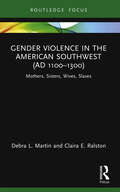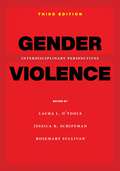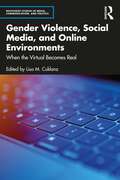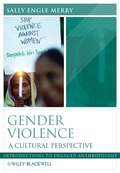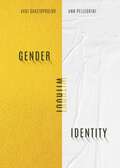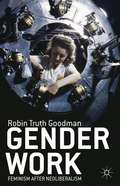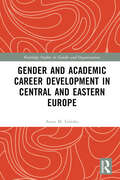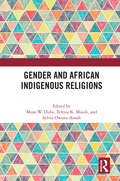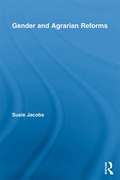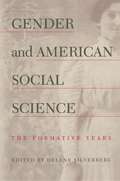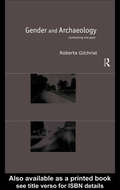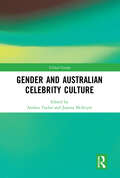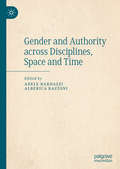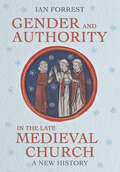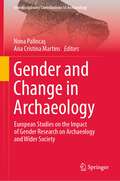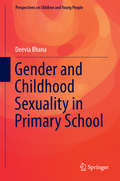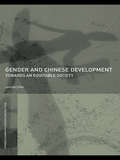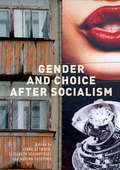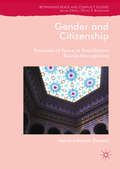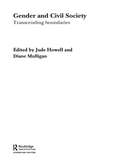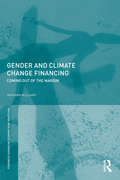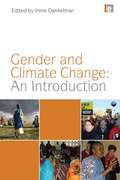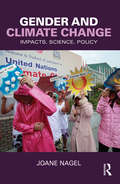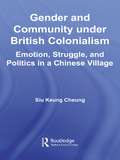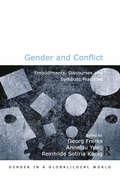- Table View
- List View
Gender Violence in the American Southwest: Mothers, Sisters, Wives, Slaves (Bodies and Lives)
by Debra L. Martin Claira E RalstonThis volume uses osteobiography and individual-level analyses of burials retrieved from the La Plata River Valley (New Mexico) to illustrate the variety of roles that Ancestral Pueblo women played in the past (circa AD 1100–1300). The experiences of women as a result of their gender, age, and status over the life course are reconstructed, with consideration given to the gendered forms of violence they were subject to and the consequences of social violence on health. The authors demonstrate the utility of a modern bioarchaeological approach that combines social theories about gender and violence with burial data in conjunction with information from many other sources—including archaeological reconstruction of homes and communities, ethnohistoric resources available on Pueblo society, and Pueblo women’s contemporary voices. This analysis presents a more accurate, nuanced, and complex picture of life in the past for mothers, sisters, wives, and, captives.
Gender Violence, 3rd Edition: Interdisciplinary Perspectives
by Laura L. O’Toole, Jessica R. Schiffman, and Rosemary SullivanAn updated edition of the groundbreaking anthology that explores the proliferation of gendered violenceFrom Harvey Weinstein to Brett Kavanaugh, accusations of gender violence saturate today’s headlines. In this fully revised edition of Gender Violence, Laura L. O’Toole, Jessica R. Schiffman, and Rosemary Sullivan bring together a new, interdisciplinary group of scholars, with up-to-date material on emerging issues like workplace harassment, transgender violence, intersectionality, and the #MeToo movement. Contributors provide a fresh, informed perspective on gender violence, in all of its various forms. With twenty-nine new contributors, and twelve original essays, the third edition now includes emerging contemporary issues such as LGBTQ violence, sex work, and toxic masculinity. A trailblazing text, Gender Violence, Third Edition is an essential read for students, activists, and others.
Gender Violence, Social Media, and Online Environments: When the Virtual Becomes Real (Routledge Studies in Media, Communication, and Politics)
by Lisa M. CuklanzThis book examines contexts, practices, and activism on issues of gender violence at the intersections of online and public spaces. Through individual case studies, the volume considers the interplay between the virtual worlds of online spaces including social media, physical spaces and bodies, and the ways in which offline and online dimensions of experience can serve as motivators for, extensions of, or limitations to each other. Examining both problems and potential solutions, chapters explore the impacts of, and potential resistance to, the intersections of gender violence, social media, and our complex lived environments across national boundaries. Throughout the volume, close attention is paid to the difficult issues highlighted when prior conceptions of basic foundations such as public space, individual rights, and professional responsibility are confronted by new examples that further trouble the boundaries of long-held frameworks of legal, social, professional understanding, and even our comprehension of the "real." Each chapter grapples with a difficult reality related to gender violence, underscores possible ways forward, and highlights limitations, resisting easy answers to complex and persistent questions about rights, personal integrity, and social responsibility. Offering clear insights into a critical issue, this book will be of interest to scholars and students in the areas of media studies, social media, gender and women's studies, sociology and criminology, digital humanities, and politics.
Gender Violence: A Cultural Perspective (Wiley Blackwell Introduction to Engaged Anthropology Series #3)
by Sally Engle MerryTaking an anthropological perspective, this comprehensive book offers a highly readable and concise overview of what constitutes gender violence, its social context, and important directions in intervention and reform. Uses stories, personal accounts, case studies and a global perspective to provide a vivid and engaging portrait of forms of violence in gendered relationships Extensively covers many forms of gender violence including domestic violence, rape, murder, wartime sexual assault, prison and police violence, female genital cutting, dowry murders, female infanticide, “honor” killings, and sex trafficking Examines major approaches to diminishing gender violence such as criminalization, batterer retraining programs, and human rights interventions Highlights the role of social movements in defining the problem and mobilizing reforms in the US and internationally
Gender Without Identity
by Ann Pellegrini Avgi SaketopoulouWinner of the 2024 Silver Medal for LGBTQ+ Non-Fiction from the Independent Publisher Book Awards.Offers a radical theory of gender formation and its ongoing mutationsGender Without Identity challenges the argument widely embraced by rights activists and many members of the LGBTQ+ community that gender identity is innate and immutable. Avgi Saketopoulou and Ann Pellegrini chart another path towards the flourishing of queer and trans life. Positing that the idea of an innate core gender identity is simplistic, problematic, and, even, potentially harmful to LGBTQ+ people, they instead argue that gender is something all subjects acquire.Trauma, they provocatively propose, sometimes has a share in that acquisition. In their way of thinking, lived trauma as well as structural and intergenerationally transmitted traumatic debris may become a resource for transness and queerness. Such a suggestion importantly counters conservative accounts that identify trauma as disrupting or “warping” some putatively “normal” gender. Rooted in the work of French psychoanalyst Jean Laplanche, in queer and trans of color critique, and in the authors’ extensive clinical experience with queer and trans people, Gender Without Identity offers a radical theory of gender formation and its ongoing mutations.
Gender Work
by Robin Truth GoodmanRecently, labor has acquired a re-emergent public relevance. In response, feminist theory urgently needs to reconsider the relationship between labor and gender. This book builds a theoretically-informed politics about changes in the gendered structure of labor by analyzing how the symbolic power of gender is put in the service of neoliberal practices. Goodman traces the cultural contextualization of 'women's work' from its Marxist roots to its current practices. From the income gap to the gendering of industries, Goodman explores and critiques the rise of corporate power under neoliberalism and the ways and whys that femininity has become one of its principle commodities.
Gender and Academic Career Development in Central and Eastern Europe (Routledge Studies in Gender and Organizations)
by Anna M. GórskaThe nature of academic institutions is inherently gendered. This is because higher education institutions (HEIs) do not operate in a void but, rather, are part and parcel of patriarchal social structures. This book offers a comprehensive presentation of the gendered and gendering academic career development. It explores various scholarly roles that academics face throughout their careers and how they are gendered in their nature. The book connects relevant literature on the topic with novel empirical studies to increase the understanding how gender is played in academia across different roles and different career stages. The empirical context is conducted in Central and Eastern Europe that sheds new light on the gendered and gendering nature in academia in the region. The book also offers propositions on how to undo gender academia to make it a more inclusive workplace for all. Dedicated for an academic reader employed in higher education institutions, particularly among those who are involved in the management of such institutions this volume will be of great interest to researchers, academics, and advanced students in the fields of human resource management, organizational studies, higher education, and gender studies.
Gender and African Indigenous Religions
by Musa W. Dube Telesia K. Musili Sylvia Owusu-AnsahFocusing on the work of contemporary African women researchers, this volume explores feminist perspectives in relation to African Indigenous Religions (AIR). It evaluates what the Circle of Concerned African Women Theologians’ research has achieved and proposed since its launch in 1989, their contribution to the world of knowledge and liberation, and the potential application to nurturing a justice-oriented world. The book considers the methodologies used amongst the Circle to study African Indigenous Religions, the AIR sources of knowledge that are drawn on, and the way in which women are characterized. It reflects on how ideas drawn from African Indigenous Religions might address issues of patriarchy, colonialism, capitalism, racism, tribalism, and sexual and disability-based discrimination. The chapters examine theologies of specific figures. The book will be of interest to scholars of religion, gender studies, Indigenous studies, and African studies.
Gender and Agrarian Reforms (Routledge International Studies of Women and Place)
by Susie JacobsThe redistribution of land has profound implications for women and for gender relations; however, gender issues have been marginalised from both theoretical and policy discussions of agrarian reform. This book presents an overview of gender and agrarian reform experiences globally. Jacobs highlights case studies from Latin America, Asia, Africa and eastern Europe and also compares agrarian and land reforms organised along collective lines as well as along individual household lines. This volume will be of interest to scholars in Geography, Women’s Studies, and Economics.
Gender and American Social Science: The Formative Years
by Helene SilverbergThis collection of essays provides the first systematic and multidisciplinary analysis of the role of gender in the formation and dissemination of the American social sciences in the late nineteenth and early twentieth centuries. Other books have traced the history of academic social science without paying attention to gender, or have described women's social activism while ignoring its relation to the production of new social knowledge. In contrast, this volume draws long overdue attention to the ways in which changing gender relations shaped the development and organization of the new social knowledge. And it challenges the privileged position that academic--and mostly male--social science has been granted in traditional histories by showing how women produced and popularized new forms of social knowledge in such places as settlement houses and the Russell Sage Foundation. The book's varied perspectives, building on recent work in history and feminist theory, break from the traditional view of the social sciences as objective bodies of expert knowledge. Contributors examine new forms of social knowledge, rather, as discourses about gender relations and as methods of cultural critique. The book will create a new framework for understanding the development of both social science and the history of gender relations in the United States. The contributors are: Guy Alchon, Nancy Berlage, Desley Deacon, Mary Dietz, James Farr, Nancy Folbre, Kathryn Kish Sklar, Dorothy Ross, Helene Silverberg, and Kamala Visweswaran.
Gender and Archaeology: Contesting the Past
by Roberta GilchristGender and Archaeology is the first volume to critically review the development of this now key topic internationally, across a range of periods and material culture. ^l Roberta Gilchrist explores the significance of the feminist epistemologies. She shows the unique perspective that gender archaeology can bring to bear on issues such as division of labour and the life course. She examines issues of sexuality, and the embodiment of sexual identity. A substantial case study of gender space and metaphor in the medieval English castle is used to draw together and illustrate these issues.
Gender and Australian Celebrity Culture (Global Gender)
by Anthea Taylor Joanna McIntyreThis intellectually vibrant volume is the first collection to deal with Australian celebrity in ways that account for both cultural and gendered specificities, demonstrating how gendered ways of imagining Australia are reinforced and contested in celebrity representations and self-presentations. Gender and Australian Celebrity Culture engages with celebrities across a diverse range of fields – actors, journalists, athletes, comedians, writers, and television personalities – and in doing so critically reflects upon different forms of Australian fame and the media platforms and practices that sustain them. Authors in this volume engage directly with pertinent issues relating to gender and sexuality, including celebrity feminism and the generative capacity of feminist rage; normative femininity and its instability; hegemonic masculinities; and queerness and its (in)visibility. Contributors also intervene in a number of ongoing debates in media and cultural studies more broadly, including those around the politics and affordances of digital media; whiteness and Australia’s colonial histories; celebrity labour; and methodologies for celebrity studies. This timely collection urges scholars of celebrity to attend further both to the gendered nature of celebrity culture and to local conditions of production and consumption. This book will be of key interest to researchers and graduate students in cultural studies, television and film studies, digital media studies, critical race and whiteness studies, gender and sexuality studies, and literary studies.
Gender and Authority across Disciplines, Space and Time
by Adele Bardazzi Alberica BazzoniThis edited collection investigates the relationship between gender and authority across geographical contexts, periods and fields. Who is recognized as a legitimate voice in debate and decision-making, and how is that legitimization produced? Through a variety of methodological approaches, the chapters address some of the most pressing and controversial themes under scrutiny in current feminist scholarship and activism, such as pornography, political representation, LGBTI struggles, female genital mutilation, the #MeToo movement, abortion, divorce and consent. Organized into three sections, “Politics,” “Law and Religion,” and “Imaginaries,” the contributors highlight formal and informal aspects of authority, its gendered and racialized configurations, and practices of solidarity, resistance and subversion by traditionally disempowered subjects. In dialogue with feminist scholarship on power and agency, the notion of authority as elaborated here offers a distinctive lens to critique political and epistemic foundations of inequality and oppression, and will be of use to scholars and students across gender studies, sociology, politics, linguistics, theology, history, law, film, and literature.
Gender and Authority in the Late Medieval Church: A New History (Medieval Societies, Religions, and Cultures)
by Ian ForrestGender and Authority in the Late Medieval Church asks a deceptively simple question: How did the governance of the medieval institutional church remain exclusively male, despite plentiful evidence of women being as capable and devout as men? The remarkable endurance of an all-male clergy is an important element of medieval church government—one that is frequently taken for granted in the historiography—and is connected to another overlooked feature of episcopal authority: the strategies that bishops used to secure the compliance of a relatively autonomous clergy. As Ian Forrest shows, bishops kept their clergy in check through normative standards of masculinity that necessarily disqualified women from leadership roles. Everywhere in the medieval church were women who had the capacity, the resources, and often the ambition to take part in governance, from abbesses to priests' servants, mothers, sisters, and unofficial wives. Bringing together evidence of female activity at the margins of the institutional church, Forrest argues that the male monopoly on formal power was haunted by female capability and aspiration at every turn. Drawing on case studies from the English diocesan clergy between the mid-thirteenth and early sixteenth centuries, he explores how women's involvement in governance was rendered unthinkable through the very discursive strategies that bishops used to control their male clergy. In doing so, Gender and Authority in the Late Medieval Church tells an integrated history that explains how both the exclusion of women and the inclusion of men underpin a rigidly gendered system of religious governance.
Gender and Change in Archaeology: European Studies on the Impact of Gender Research on Archaeology and Wider Society (Interdisciplinary Contributions to Archaeology)
by Nona Palincaş Ana Cristina MartinsThis volume presents the various ways in which the study of gender makes a difference in archaeological research, the archaeological academic milieu and the wider public’s thinking about gender and considers avenues of future development. It addresses questions such as why gender matters for archaeology, while examining gender from various angles (including aspects such as subjectivity, embodiment, diet, multifaceted perspectives and intersectionality) and in various periods (prehistory, Ancient Egypt, Roman antiquity, the Middle Ages and the modern and contemporary periods). It also discusses the relationship between archaeology and other academic fields involving the study of gender, as well as representations and debates on gender in the media. The theme ‘gender and change in archeology’ emerged out of concerns voiced within the ‘Archaeology and Gender in Europe’ (AGE) working community of the European Association of Archaeologists (EAA) with respect to thefuture of gender archaeology. This book unites researchers of gender archaeology from two perspectives: that of gender archaeologists from academic milieus where the study of gender has long been established and who in the meantime came to feel that this avenue of inquiry had become predictable and lost its provocative power, and that of gender archaeologists from countries where this field was only recently introduced and who, while more enthusiastic about the utility of gender archaeology, are concerned with how to disseminate it among skeptical peers. Both groups of archaeologists mainly argue that, four decades on, the study of gender in archaeology is still able to generate considerable change in our understanding of past and present-day societies. The volume is primarily of interest to archaeologists and researchers of gender studies.
Gender and Childhood Sexuality in Primary School
by Deevia BhanaThis book is an ethnography of teachers and children in grades 1 and 2, and presents arguments about why we should take gender and childhood sexuality seriously in the early years of South African primary schooling. Taking issue with dominant discourses which assumes children's lack of agency, the book questions the epistemological foundations of childhood discourses that produce innocence. It examines the paradox between teachers' dominant narratives of childhood innocence and children's own conceptualisation of gender and sexuality inside the classroom, with peers, in heterosexual games, in the playground and through boyfriend-girlfriend relationships. It examines the nuances and finely situated experiences which draw attention to hegemonic masculinity and femininity where boys and girls challenge and contest relations of power. The book focuses on the early makings of gender and sexual harassment and shows how violent gender relations are manifest even amongst very young boys and girls. Attention is given to the interconnections with race, class, structural inequalities, as well as the actions of boys and girls as navigate gender and sexuality at school. The book argues that the early years of primary schooling are a key site for the production and reproduction of gender and sexuality. Gender reform strategies are vital in this sector of schooling.
Gender and Chinese Development: Towards an Equitable Society (Routledge IAFFE Advances in Feminist Economics)
by Lanyan ChenThis book takes a look beneath the surface of this "miracle growth", to explore the political economy of this process. Beyond the superficial macroeconomics of high growth rates, increasing GDP per capita and high trade volume, the book looks at what is happening to the very socioeconomic and political fabric of society; particularly in terms of the transformation of gender relations. Chen’s study explores: how the gender impacts of government policies shape the unequal realities of women, how women have carried on in production and social reproduction and made efforts to improve their status, and how women could potentially adopt a strategy to overcome the gender impacts so as to attain the equality and justice they have been promised by the Chinese government in a harmonious "well off" society. This book is a core resource for all students of Chinese economics and development studies. The book is also relevant to those who are involved in research and teaching on gender and development and women’s studies.
Gender and Choice after Socialism
by Lynne Attwood Elisabeth Schimpfössl Marina YusupovaThe end of socialism in the Soviet Union and its satellite states ushered in a new era of choice. Yet the idea that people are really free to live as they choose turns out to be problematic. Personal choice is limited by a range of factors such as a person’s economic situation, class, age, government policies and social expectations, especially regarding gender roles. Furthermore, the notion of free choice is a crucial feature of capitalist ideology, and can be manipulated in the interests of the market. This edited collection explores the complexity of choice in Russia and Ukraine. The contributors explore how the new choices available to people after the collapse of the Soviet Union have interacted with and influenced gender identities and gender, and how choice has become one of the driving forces of class-formation in countries which were, in the Soviet era, supposedly classless. The book will of interest to students and scholars across a range of subjects including gender and sexualities studies, history, sociology and political science.
Gender and Citizenship: Promises Of Peace In Post-dayton Bosnia-herzegovina (Rethinking Peace and Conflict Studies)
by Maria-Adriana DeianaThis book examines the remaking of women’s citizenship in the aftermath of conflict and international intervention. It develops a feminist critique of consociationalism as the dominant model of post-conflict governance by tracking the gendered implications of the Dayton Peace Agreement. It illustrates how the legitimisation of ethnonationalist power enabled by the agreement has reduced citizenship to an all-encompassing logic of ethnonational belonging and implicitly reproduced its attendant patriarchal gender order. Foregrounding women’s diverse experiences, the book reveals gendered ramifications produced at the intersection of conflict, ethno-nationalism and international peacebuilding. Deploying a multidimensional feminist approach centred around women’s narratives of belonging, exclusion, and agency, this book offers a critical interrogation of the promises of peace and explores individual/collective efforts to re-imagine citizenship.
Gender and Civil Society: Transcending Boundaries (Routledge Advances in International Relations and Global Politics)
by Jude Howell Diane MulliganOver the last two decades there has been considerable enthusiasm for the concept of civil society amongst researchers, practitioners and activists. Yet despite this enthusiasm for the concept, the gendered nature of civil society and the impact of feminist organizing on civil society has received minimal attention.This edited volume seeks to address this gap, and considers:* how the political environment and nature of the state shapes the way women organize, the issues they address, and their capacity to affect changes in state policies on gender* is the women's movement structurally different from other civil society organizations?* does the gender lens alter our vision of civil society?The chapters in this volume pursue two or more of these questions and cover a diversity of contexts, including the US, East and Central Europe, China, the Middle East, Africa, South East Asia, Central America and Chile. This book not only draws together the concepts of gender and civil society, but also adopts an international perspective, highlighting the diverse trajectories of women organizing in different country contexts and the historical, cultural and political specificities of civil society.
Gender and Climate Change Financing: Coming out of the margin (Routledge IAFFE Advances in Feminist Economics)
by Mariama WilliamsThis book discusses the state of global climate change policy and the financing of climate resilient public infrastructure. It explains the sources of tensions and conflict between developing and developed countries with regard to global climate protection policies, and highlights the biases and asymmetries that may work against gender equality, women’s empowerment and poverty eradication. Gender and Climate Change Financing: Coming Out of the Margin provides an overview of the scientific, economic and political dynamics underlying global climate protection. It explores the controversial issues that have stalled global climate negotiations and offers a clear explanation of the link between adaptation and mitigation strategies and gender issue. It also maps the full range of public, private and market-based climate finance instruments and funds. This book will be a useful tool for those engaged with climate change, poverty eradication, gender equality and women’s empowerment.
Gender and Climate Change: An Introduction
by Irene DankelmanAlthough climate change affects everybody it is not gender neutral. It has significant social impacts and magnifies existing inequalities such as the disparity between women and men in their vulnerability and ability to cope with this global phenomenon. This new textbook, edited by one of the authors of the seminal Women and the Environment in the Third World: Alliance for the Future (1988) which first exposed the links between environmental degradation and unequal impacts on women, provides a comprehensive introduction to gender aspects of climate change. Over 35 authors have contributed to the book. It starts with a short history of the thinking and practice around gender and sustainable development over the past decades. Next it provides a theoretical framework for analyzing climate change manifestations and policies from the perspective of gender and human security. Drawing on new research, the actual and potential effects of climate change on gender equality and women's vulnerabilities are examined, both in rural and urban contexts. This is illustrated with a rich range of case studies from all over the world and valuable lessons are drawn from these real experiences. Too often women are primarily seen as victims of climate change, and their positive roles as agents of change and contributors to livelihood strategies are neglected. The book disputes this characterization and provides many examples of how women around the world organize and build resilience and adapt to climate change and the role they are playing in climate change mitigation. The final section looks at how far gender mainstreaming in climate mitigation and adaptation has advanced, the policy frameworks in place and how we can move from policy to effective action. Accompanied by a wide range of references and key resources, this book provides students and professionals with an essential, comprehensive introduction to the gender aspects of climate change.
Gender and Climate Change: Impacts, Science, Policy
by Joane NagelDoes gender matter in global climate change? This timely and provocative book takes readers on a guided tour of basic climate science, then holds up a gender lens to find out what has been overlooked in popular discussion, research, and policy debates. We see that, around the world, more women than men die in climate-related natural disasters; the history of science and war are intimately interwoven masculine occupations and preoccupations; and conservative men and their interests drive the climate change denial machine. We also see that climate policymakers who embrace big science approaches and solutions to climate change are predominantly male with an ideology of perpetual economic growth, and an agenda that marginalizes the interests of women and developing economies. The book uses vivid case studies to highlight the sometimes surprising differential, gendered impacts of climate changes.
Gender and Community Under British Colonialism: Emotion, Struggle and Politics in a Chinese Village (East Asian Studies)
by Siu Keung CheungGender and Community Under British Colonialism is a study of continuity and change in village communities in the New Territories of Hong Kong, China.
Gender and Conflict: Embodiments, Discourses and Symbolic Practices (Gender in a Global/Local World)
by Georg Frerks Annelou YpeijThrough an in-depth analysis of the multifaceted manifestations of gender and conflict, this book shows how cognition and behaviour, agency and victimization, are gendered beyond the popular stereotypes. Conflict not only reconfirms social hierarchies and power relations, but also motivates people to transgress cultural boundaries and redefine their self-images and identities. The contributions are a mix of classical ethnography, performance studies and embodiment studies, showing ’emotions and feelings’ often denied in scientific social research. Strong in their constructivist approach and unorthodox in theory, the articles touch upon the dynamic relation between the discourses, embodiments and symbolic practices that constitute the gendered world of conflict. The localities and research sites vary from institutional settings such as a school, rebel movements, public toilets and the military to more artistic domains of gendered conflicts such as prison theatre classes and the capoeira ring. At the same time, these conflicts and domains appropriate wider discourses and practices of a global nature, demonstrating the globalised and institutionalised nature of the nexus gender-conflict. A first set of chapters deals with ’breaking the gender taboos’ and renegotiating the stereotypical gender roles - masculinities or femininities - during conflict. A second set of chapters focuses more explicitly on the bodily experience of conflict either physically of symbolically, while the last set straddle body and narrative. The inductive quality of the work leads to unexpected insights and does give access to worlds that are new, and often surprising and unconventional.
